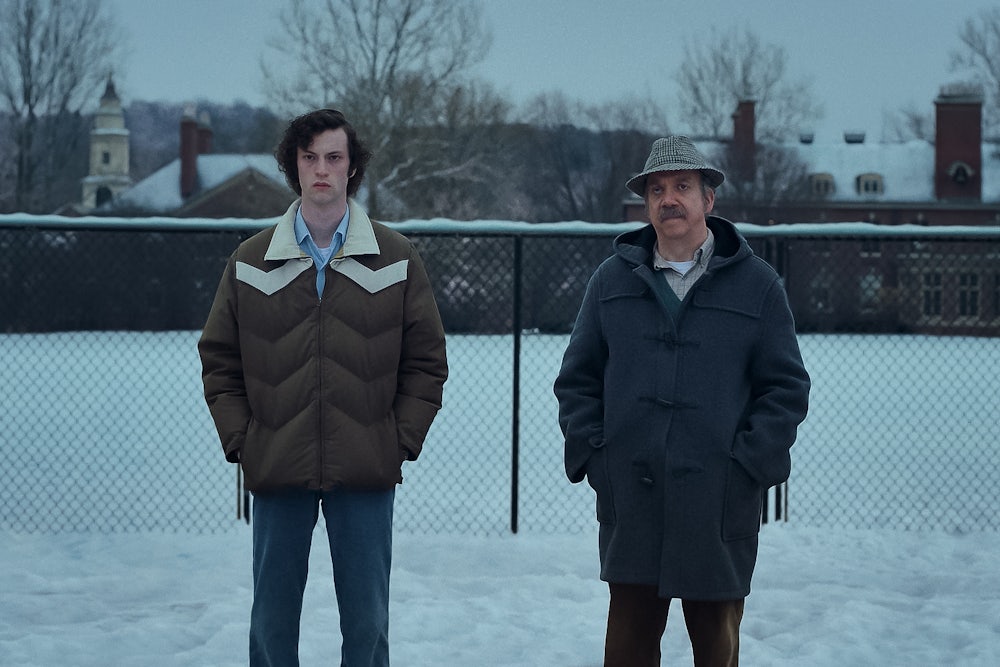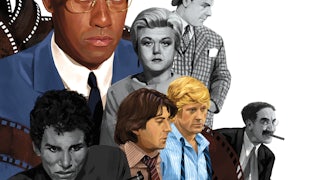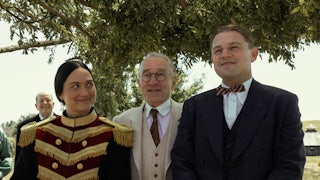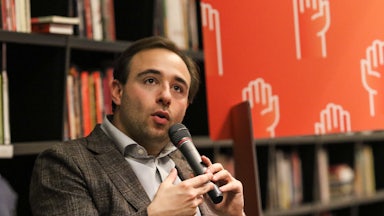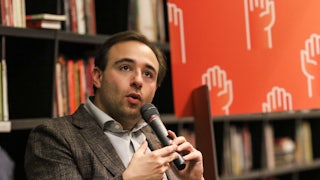In writer-director Alexander Payne’s 2017 film, Downsizing, Paul Safranek (Matt Damon) chooses to shrink down and live at five inches tall. By getting small, he can live large and provide a better life for his wife; it will also help save the planet, we’re told. But when his wife, at the last minute, pulls out of the “downsizing” procedure, Paul must embark on this adventure—a surreal simulacrum of the good life—alone. In one of the film’s most darkly humorous moments, a tiny Paul mournfully signs his regular-human-size divorce papers. “I really wish you’d taken her first offer,” the lawyer says before asking him to write bigger.
This may sound like a men’s rights fever dream, but, in execution, it is anything but; Payne’s films are less about what women do to men and more about what men do to themselves. “You are nice guy, Paul, but little bit pathetic guy,” his playboy neighbor informs him, later telling a mutual acquaintance, “Nothing he ever wants to do works out.” Downsizing may be one of Payne’s minor works (certainly his least acclaimed), but it provides a useful blueprint for the filmmaker’s running motifs: diminished masculinity, emotional impotence, men as oblivious as they are unhappy. As philandering soap star Jack (Thomas Haden Church) tells his friend Miles (Paul Giamatti) in Payne’s 2004 Sideways, “You understand wine and literature and movies, but you don’t understand my plight.”
Payne is the maestro of the emasculation comedy, in which men try to live with dignity and meet with grave embarrassment instead. For a world that has seemingly been designed for their pleasure and comfort, it’s all so unpleasant, so uncomfortable. There’s an extra joke layered in when these miserable nobodies are played by George Clooney (in The Descendants) and Matt Damon. The archetypes that these actors embody in other films—cool guy, bad-boy genius, chick magnet—are utterly detached from the roles they play in Payne films: empowered but helpless, considerate but selfish, in control but, somehow, untethered.
Payne’s new film, The Holdovers, offers a kind of origin story for these men. Set at an all-boys prep school, this throwback dramedy examines the tender bonds that develop between three lonely people—a teacher, a cook, and a student—who can’t, or won’t, go home for the holidays. And while Barton Academy, where they live and work, may turn off the heat to save money over Christmas and New Year’s, let’s just say it’s a chilly place year-round. Equal parts funny and touching, The Holdovers is a study of how men of privilege and status are formed, and how codes of masculine behavior make for bad feelings and better comedy.
Payne has a thing for schoolteachers and the degradations they suffer. The job’s downsides are unrelenting: The pay is low, the surroundings unglamorous, the student body snide and ungrateful. God help us if these children are our future; even more so if aggrieved men teachers like Election’s Mr. M (Matthew Broderick) and Sideways’ Miles (Paul Giamatti) are their stewards toward adulthood.
Paul Hunham (Giamatti, again) certainly has elements of those characters. When we meet him, he is grading papers with his signature harshness, muttering about the “lazy,” “vulgar” “philistines” in his class. Hunham is the longtime, much despised Ancient Civilization teacher at Barton, where he was once a student. The school proves a daunting, frigid character in its own right, all icy streams, naked trees, and mahogany walls covered with oil paintings of Important People. The men in these portraits glare down from on high, fixing their stern and haughty glares on the present, which in this case is 1970s New England. Everything from the film stock to the font and style of the opening credits hearkens to the ’70s, but the school itself is a veritable time machine, a holdover from 1787, when, presumably, a group of punishing Protestants opened the school so that, one day, their great-great-grandsons could smoke weed in the parking lot.
Courage, good fellowship, honesty—these are the things that make a Barton man, then and now. But when Hunham refuses to pass a donor’s son in his class, he is condemned by the head of school—once Hunham’s mediocre student, now his mediocre boss—to spend the holidays babysitting the boys whose parents aren’t coming to retrieve them. One boy, for example, can’t join his family’s ski trip until he cuts his hair, while another’s mother and father are on a missionary trip.
Over time, a particular bond emerges between Hunham, a smart but troubled student named Angus (newcomer Dominic Sessa), and the cafeteria cook, Mary (the always pitch-perfect Da’Vine Joy Randolph), who is surviving her first Christmas since her son died in Vietnam. At first, Mary is the only person Hunham can talk to. They enjoy game shows together, even though he doesn’t watch or even have a television (of course he doesn’t). Hunham explains to Mary how he hopes to write a scholarly monograph one day. He doesn’t have a full book in him, he explains, to which Mary gently scolds, “You can’t even dream a whole dream, can you?”
In one sense, Hunham’s modest existence is textbook Payne: His intellect and imagination loom large, but his stature in the world clocks in at about five inches. But the men in Payne’s movies can be angry and entitled, certain that their sensitivity entitles them to be a little insensitive once in a while. Even the women, like the title character in his first feature, Citizen Ruth (1996), are prone to narcissistic and self-involved behavior, unable to recognize their suffering in relation to others’, to think or care about other people at all.
What makes The Holdovers different is how clearly these characters see themselves in their proper context. Despite his cranky energy, Hunham is vulnerable, introspective, and, ultimately, even harder on himself than he is on others. If Payne’s men are usually unmoored, Hunham is weighed down; he is not an exhibit of Barton manhood but an obvious victim of its constraints.
The film offers a limited menu of masculine options, of roles to play, and they’re mostly lousy: to pursue a life of the mind only to be racked with tedium and loneliness; to die in Vietnam before you can take advantage of the G.I. Bill’s free college program; to be left behind and shut away, in one institution or another, when you are no longer deemed useful. This is what it is like to be a Barton man. The only ones who escape these bleaker fates are “rich and dumb”—“a popular combination around here,” Mary cracks—jerks and tools and descriptors too colorful (and funny) to spoil here. The headmaster (Andrew Garman) is one of the lucky few; Angus’s godawful stepfather (Tate Donovan) another.
Between the cultural upheavals of the 1960s and administrators’ drive to accrue more tuition checks, the majority of universities and elite private schools abandoned single-sex education around the time of the movie. Phillips Exeter in New Hampshire had its first co-ed class in 1971; Phillips Academy (or Andover) in Massachusetts opened up in 1973; the Groton School in Massachussetts became co-ed in 1975. Among the holdovers, or, perhaps, the holdouts, was Deerfield Academy, which did not admit women until 1989.
This shift in the culture has not reached the men and boys of the fictional Barton Academy, the school a staunch laboratory for archaic norms of masculine privilege and stoicism. It’s not just Hunham and Angus who must change, but the place itself and all its attendant ideologies. “No one is his own father,” Hunham assures an anguished Angus. He might have added that, contrary to what the school handbook might say, no one is his own forefather either.
Payne’s instinct to mock and burlesque—an impulse I’ve found darkly satisfying these past 25 years—is tempered with uncharacteristic kindness. (The story came from Payne but was turned into a screenplay by David Hemingson.) It’s not Payne’s funniest film, but it does address the question that many of his films ask: If men shouldn’t be like this, what should they be like? And the answer is, well, sort of like this. Paul and Angus tease one another fondly and without malice, speak with candor and not cruelty. To come within even an arm’s length of the Barton man ideal, the two must thumb their noses at the concept entirely. And by sharing his hard-earned wisdom rather than relying on hierarchical authority or hero worship—no one will be standing on any desks anytime soon—Hunham accesses his best, most teacherly self. “History is not simply the study of the past,” he tells Angus as they tour a museum. “It is an explanation of the present.” Something similar could be said of The Holdovers and its keen attention to toxic masculinity, a newish term with deep and distinguished roots.
At the end of Sideways, Miles stands in front of his class, ruminating on the events of Jack’s bachelor weekend as one of his students reads from John Knowles’s 1957 novel, A Separate Peace:
I did not cry then or ever about Finny. I did not cry even when I stood watching him being lowered into his family’s straightlaced burial ground outside of Boston. I could not escape a feeling that this was my own funeral, and you do not cry in that case.
Because Knowles’s book, turned into a film in 1971, was set in a boarding school much like Barton Academy, I can’t help but feel that this 20-year-old scene served as the seed for Payne’s new film. The Holdovers looks back at this old-school pageantry of male alienation and isolation, of promise and privilege, that many of us encountered through reading A Separate Peace and a chosen few endured in real life. Maybe Payne had it right—maybe these fellas just need a good cry. Maybe we do too.
